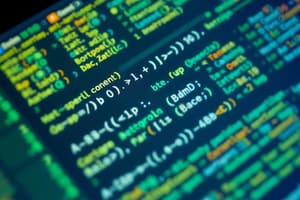Podcast
Questions and Answers
What purpose do variables serve in computer programming?
What purpose do variables serve in computer programming?
- To display output on the screen
- To create loops in the code
- To hold data values that can be manipulated during execution (correct)
- To perform mathematical calculations
How do you declare a variable in Small Basic?
How do you declare a variable in Small Basic?
- Using Print to declare the variable
- Using If-Else statement to declare the variable
- Using Loop to declare the variable
- Using Dim followed by the variable name (correct)
What is the purpose of assigning a value to a variable?
What is the purpose of assigning a value to a variable?
- To remove the variable from memory
- To clear the variable's contents
- To print the variable's value
- To store initial data in the variable (correct)
Why must variables have unique names in Small Basic?
Why must variables have unique names in Small Basic?
Which of the following is NOT a valid naming rule for Small Basic variables?
Which of the following is NOT a valid naming rule for Small Basic variables?
What is the purpose of accessing a variable in Small Basic?
What is the purpose of accessing a variable in Small Basic?
What happens to a variable declared within a specific block in Small Basic?
What happens to a variable declared within a specific block in Small Basic?
How does Small Basic handle type conversion during arithmetic operations involving variables of different types?
How does Small Basic handle type conversion during arithmetic operations involving variables of different types?
What is the purpose of reassignments when working with variables in Small Basic?
What is the purpose of reassignments when working with variables in Small Basic?
Why is consistent variable naming convention important when collaborating with other developers?
Why is consistent variable naming convention important when collaborating with other developers?
What foundational role do variables play in Small Basic programming?
What foundational role do variables play in Small Basic programming?
'Arrays' and 'lists' in Small Basic are used for what purpose?
'Arrays' and 'lists' in Small Basic are used for what purpose?
Flashcards
Variable
Variable
A container that holds data values which can change.
Declaration
Declaration
The step of creating a variable and defining its type.
Assignment
Assignment
The act of setting a value to a variable.
Accessing variables
Accessing variables
Signup and view all the flashcards
Local Scope
Local Scope
Signup and view all the flashcards
Reassignments
Reassignments
Signup and view all the flashcards
Type Conversion
Type Conversion
Signup and view all the flashcards
Variable Naming Convention
Variable Naming Convention
Signup and view all the flashcards
Unique Names
Unique Names
Signup and view all the flashcards
Integer Type
Integer Type
Signup and view all the flashcards
Types of Variables
Types of Variables
Signup and view all the flashcards
Arrays
Arrays
Signup and view all the flashcards
Study Notes
Small Basic's Foundational Building Block: Understanding Variables
In the world of computer programming, variables serve as containers holding data values you can manipulate during execution. As you dive into the simple yet powerful language called Small Basic, getting comfortable with variables will form a strong foundation for your coding journey. Let's explore how this will help us create more complex programs step by step.
A variable is like a labeled box where you store information throughout a program's run. In Small Basic, we declare these boxes using the following syntax:
Dim myVarName as Integer // Declaring an integer type variable
myVarName = 5 // Assigning value to the declared variable
WriteLine("The value of 'myVarName': ", myVarName) // Accessing and displaying its value
The example above introduces three key concepts: declaration, assignment, and accessing variables. Please note that Small Basic supports different types such as integers, decimals, strings, booleans—each designed to hold specific kinds of data effectively.
Variables must always have unique names; otherwise, it becomes impossible for Small Basic to distinguish between them. Names cannot begin with numbers; they also shouldn't contain spaces or special characters except the underscore (_).
Now let's discuss some additional aspects related to working with variables in Small Basic:
-
Local Scope: A variable declared within a specific block is only accessible within that block and any blocks nested inside it until it reaches the end of the scope delimiter, generally denoted by curly braces ({}).
-
Reassignments: After declaring a variable, you may alter its contents multiple times using the equal sign assigning new values. This feature allows you to modify state dynamically while developing your applications.
-
Type Conversion: When performing arithmetic operations involving variables of different types, Small Basic automatically converts the appropriate types before executing the operation.
-
Variable Naming Convention: Consistent naming conventions make reading other developers' code easier when collaborating. By following conventions, you express intent and enable others to understand your intentions clearly—a best practice that applies across various programming languages.
After mastering basic usage, you might start exploring advanced features such as arrays and lists that allow handling multiple items under one container's umbrella. These constructs elevate programming complexity and versatility, equipping users to tackle tougher tasks efficiently.
Understanding variables forms an indispensable part of Small Basic learning curve because it lays down foundations enabling further exploration of the language. With this knowledge, you will be able to build increasingly ambitious projects and experience the thrill of watching your creations come to life!
Studying That Suits You
Use AI to generate personalized quizzes and flashcards to suit your learning preferences.




